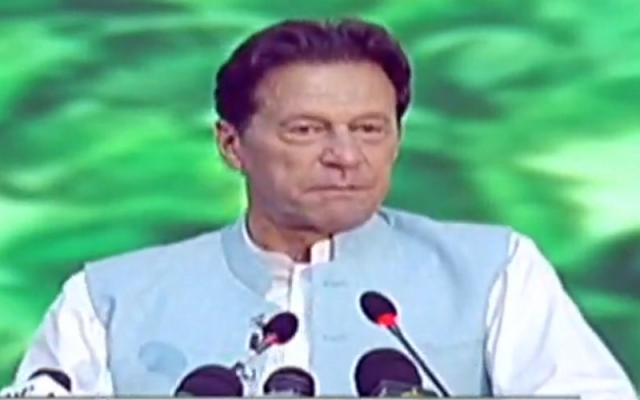Imran urges timely steps to ensure food autarky
PM warns food security challenge could become a national security issue

Prime Minister Imran Khan said on Thursday the food security was a great challenge for Pakistan, which could even become a national security issue, if timely measures were not taken to increase agricultural productivity in the country.
Addressing the Kisan Convention, which marked the launch of the government’s ‘Agriculture Transformation Plan’, the prime minister stressed that timely measures were inevitable to ensure the survival of the future generation.
“The country is faced with new challenges…The population size is growing fast. We need to prepare in advance as how to grow food for them during the next 10 to 15 years,” Imran said. “The nation which failed to grow food to suffice needs of its people, could not excel. It should be punished for slackness.”
LIVE #APPNews : Prime Minister Imran Khan addressing National Kisan Convention #Islamabad @PakPMO @Jamshediqbalch @mnfsr https://t.co/TBNEzGtYsh
— APP 🇵🇰 (@appcsocialmedia) July 1, 2021
The prime minister said that Pakistan imported 4 million tonnes of wheat last year, which had to be paid for in foreign exchange, amid already existing shortage of dollars. He also shared the alarming figures of 40% stunted growth of children because of malnutrition that cause limited growth of brain and body.
The prime minister said that the country faced shortage of pure milk, mainly because of the milk production among animals in Pakistan, was far lower than the developed countries. He said the import of sperm could have resolved the issue but the farmers neither had the awareness nor the resources.
Imran lamented that “the elite capture” was the real issue who had grabbed the resources and facilities meant for all the people. “After the creation of Pakistan, the rulers could have ensured inclusive growth but instead they created divide by promoting class-based education, health and other facilities.
Similarly, he added, farmers also faced dearth of resources to import quality seeds, build cold storages, which led to their exploitation by the middle man. “The government should first focus on the uplift of common man like in the State of Madina.
He mentioned the example of China which had steered around 700 million people out of poverty, mainly by supporting the small farmers. He also gave the example of Israel, which even turned desert into cultivable land.
“Though Pakistan does not recognise Israel owing to its oppression against Palestine, Israel achieved progress in agriculture by using modern techniques. “We have decided to take those steps from today. Instead of letting it to become a national security issues, we should become the (food) exporter.”
The government, he added, had decided to promote the cultivation of all kinds of crops and fruits as per the countrywide mapping of land and research. “The government will pay special attention to research and seed development,” he added.
The prime minister informed the audience that the inclusion of agriculture in the China-Pakistan Economic Corridor (CPEC) would also enable Pakistan to benefit from Chinese agriculture technology. He also mentioned the government’s loans scheme under the Kamyab Jawan Programme.
“Through the Kissan Card, the government will provide direct subsidy to the farmers with little land holdings. The farmers will also be trained in modern trends and techniques in agriculture,” he said, assuring the farmers that the government would endeavour to know their issues and ensure resolution.
He said as the farmers got Rs 1,100 billion for the crops of wheat, sugarcane and rice, which led to the bumper crop and the farmers put in extra money to enhance their yield. He added the government would strive for farmers’ prosperity who would then spend more money on land and increased yields.
He regretted that around 30% of produce like fruits and vegetables were wasted owing to the absence of storage and proper transport facilities. Imran said that an olive revolution was in the making in Pakistan and the country would emerge as an olive exporter within next few years.
Earlier, Minister for Food Security Syed Fakhar Imam said consequent to government’s policies, the farmers got six bumper crops. He added that seed technology was a major issue for Pakistan and also called for overhaul of curriculum of agriculture education and promotion or organic farming.
Separately, Prime Minister Imran chaired a meeting to review progress on the development of Ravi City and Central Business District being established in Lahore. Successful bidders of Sapphire Bay project of the Ravi City were also present during the meeting.


















COMMENTS
Comments are moderated and generally will be posted if they are on-topic and not abusive.
For more information, please see our Comments FAQ